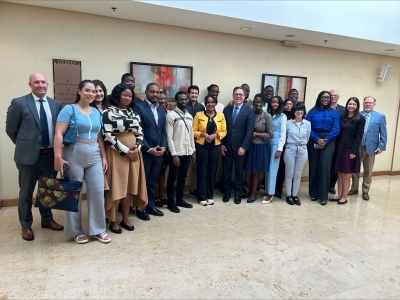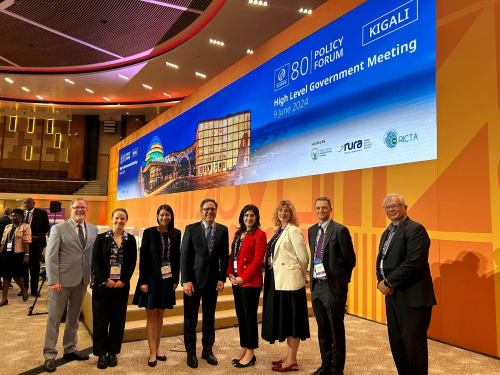Rwanda Recap: U.S. Support for Multistakeholder Internet Governance at ICANN80
By: Alan Davidson, Assistant Secretary of Commerce & NTIA Administrator
The importance of the multistakeholder system of Internet governance was on full display last month in Kigali, Rwanda during the ICANN80 High Level Government Meeting (HLGM) and Policy Forum. I was delighted to lead the U.S. Delegation to the HLGM, participate in ICANN’s forum, and meet with leaders from around the world in support of that multistakeholder system.

The HLGM brought leaders together from a wide array of countries to discuss Internet governance and the crucial role that governments play in shaping policy for the Internet’s global Domain Name System. While governments are always represented at ICANN, the HLGM is designed to bring in Minister-level representatives from each country. In a way, the HLGM is an opportunity for Ministers to experience the multistakeholder system at work.
The multistakeholder system of Internet governance is the consensus-based decision making that takes place in those technical entities which, together, constitute the decentralized infrastructure of the Internet. We call this system "multistakeholder” because it involves technical experts, civil society, academics, industry, and governments all coming together to make policy and support infrastructure.
At the HLGM, I spoke about the importance of a multilingual Internet, a high priority for NTIA’s Office of International Affairs. That is work we will continue at the ITU and at the December Internet Governance Forum in Saudi Arabia. Other sessions focused on the evolution of ICANN and the multistakeholder system of Internet governance, and on closing the digital divide in Africa. NTIA is deeply engaged on closing the digital divide in the U.S., and it was both humbling and inspiring to hear how my counterparts tackle this challenge in their own countries.
As part of President Biden’s Digital Transformation with Africa initiative, I also had a chance to meet with 26 emerging African leaders in Kigali to discuss these same issues in an NTIA-sponsored U.S. Telecommunication Training Institute program. These emerging leaders also attended the ICANN80 conference as part of their training – and I can say they are an impressive and engaging group! If this cohort is any indication, the future is bright for innovation and good policymaking on the continent.

I was pleased to participate in ICANN80 and the sessions for governments as part of the Governmental Advisory Committee. ICANN is the organization that ensures the stable and secure operation of the global Internet’s unique identifier systems. These systems are the bedrock of the Internet and provide the foundation for the content and services that citizens interact with on the Internet.
One of the biggest challenges facing ICANN today is its ability to address the needs that people have, at pace, in the face of constant change in the systems it administers. Are these systems meeting concerns about security? About privacy? Are we finding ways to make sure that the systems we are building are keeping up with what people and organizations need?
ICANN has successfully executed its mission over the last 26 years. In the face of growing challenges, ICANN and its community must work together even better to ensure the stability, security and resilience of the Internet’s unique identifier systems.
The U.S. has been involved with ICANN since its start and has always supported the multistakeholder approach. The Biden Administration supports ICANN and its ability to solve the hard problems within its scope. We believe that collaboration, cooperation, and coordination across stakeholders is not only the right way to govern the global Internet, but also the only practical way to keep the global Internet running properly.
I look forward to ICANN’s continued growth and evolution as we tackle the challenges ahead.
